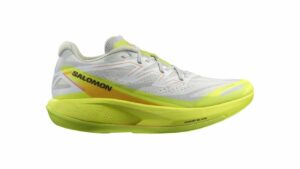Canadian women left behind
Blogger Rory Gilfillan looks at the reasons for lack of Canadian success in the women's marathon.
Tara Quinn-Smith wouldn’t be the easiest training partner to have. Anyone who chooses to the run the marathon at a high level trades comfort for pre-dawn mornings and early bedtimes.
Prior to motherhood, Quinn-Smith was locked in a doomed love affair with a sport that repays its suitors with stress fractures, tendonitis, broken hearts and fascia tears. It’s a code that isn’t for everyone — at its core, it means running a marathon actually means training properly to do it well and staying right on the brink of injury.
Like the vast majority of elite Canadian distance runners, Quinn-Smith has lived on a shoestring budget, bummed rides to races and no doubt, crashed on friends’ couches. It’s not so much of a commitment as it is a solemn oath made to a lifestyle requiring strict adherence to principles that few Canadian distance runners, until recently, have been willing to embrace.
Canada’s recent arrival at the edges of international contention in the men’s marathon has as much to do with talent as with the willingness of athletes to make the sacrifices and lifestyle choices that hone a 28-minute 10K into a 2:12 marathon.
It’s a message that has reached only a few of Canada’s elite women distance runners in the last 25 years.
Despite outstanding performances at the NCAA level, a recent superb performance in the half marathon, and a few notable times in the full over the years, Canadian women have failed to approach Canada’s Olympic standard in at least a generation.
Sure, there is a legitimate argument that the Athletics Canada standard of 2:29 is unfair and serves only to discourage elite level women from making the leap from the 10,000m to the marathon. In some cases, however, it may come down to the fact that the athletes simply weren’t fast enough to compete at the highest level. With so many women participating in the marathon, and so few Canadian women contending some hard questions need to be asked.
Alex Coffin, owner of a fitness store in New Brunswick and the mastermind behind the Marathon Canada rankings, believes that coaching and a lack of role models may be the problem.
“There doesn’t seem the same coach-driven initiative to get a couple of fast track women focused on the marathon,” Coffin said. “You just need a few like (Dylan) Wykes, (Eric) Gillis and (Reid) Coolsaet and then you get others jumping on the bandwagon.”
In a paradox, however, despite massive increases in the numbers of women in the marathon, Canadians are not getting any close to qualifying for the highest level of international competition.
It wasn’t that long ago when the Canadian men were in exactly the same position and it was only relatively recently that Reid Coolsaet made his initial breakthrough in the marathon. It’s possible that women’s marathoning is on a similar upward curve but simply further back in its evolution. However, it’s also possible that a culture that equates moral victories and personal records with actual triumphs and course records has eclipsed corporeal achievement.
Dayna Pidhoresky’s 1:11 half-marathon breakthrough didn’t happen through magical thinking and daily affirmations, but through laying down 125 to 145 hard kilometers week after week.
Pidhoresky thinks the scarcity of Canadian elite marathon runners may have more to do with priorities than a lack of talent. She believes that women who could make an impact tend to stick to shorter, collegiate driven events and then, soon after graduation, leave the sport for good.
It’s easy to understand why.
University athletics, particularly in the United States, have unprecedented perks and above all contain a rigid structure that is wholly lacking for most athletes once they graduate. Furthermore, “most women coming out of their collegiate running careers are in the process of getting married, establishing careers, and even thinking of starting a family,” Pidhoresky added.
Tara Quinn-Smith remains cautiously optimistic.
“I’m hopeful that more young women coming up are making a shift and investing themself in the [marathon] and that it will only be a matter of time before we see times coming closer to the Canadian standard.”
The marathon is “an event that definitely takes time and patience so with the right amount of investment in the training it should be doable.”
When Katherine Switzer illegally ran the Boston marathon 30 years ago, she became the first female icon in the running boom that would follow. However, what has been forgotten in the melee of the feel-good, everybody wins creed that has overwhelmed the sport ever since, Switzer was also a great runner. She won Boston in 1975 in 2:51.
It’s clear that Canada has broken with the spirit of Switzer’s heroic Boston run, which wasn’t just about showing up, but also about contending. Long distance running is still taboo for many young women, who grow up running less than the boys in high school and half the distance of men in CIS cross-country meets.
We are living in an era when running a marathon for every other reason, cause and spiritual pursuit matters more than racing. And it seems we are facing yet another Olympic marathon where there won’t be any Canadian women.


